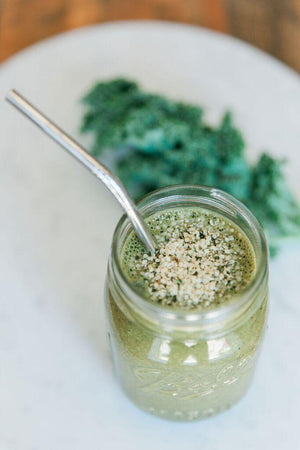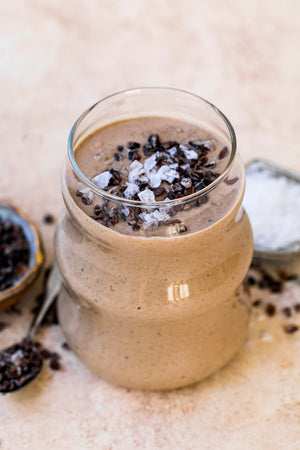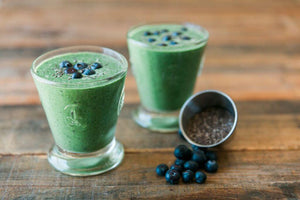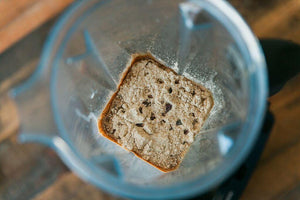If you think you have low iron, you may also be lacking copper!
Iron requires copper for proper absorption, as well as hemoglobin transport and red blood cell maturation (not blood sugar...but still equally as important).
Symptoms such as dizziness, fatigue, light-headedness, malaise, fast heart rate or palpitations, brittle nails, headache, shortness of breath, weakness, elevated anxiety, and depression are all signs of iron deficiency.
But here’s a fun fact: more than 50% of us are either mildly or severely deficient in copper. Why does this matter? Copper is responsible for iron absorption, and without sufficient amounts of copper in your diet, iron is not properly absorbed and utilized by the body.
My Favorite Foods to Increase Copper and Iron Intake
Copper is required to carry out many important functions, including hemoglobin transport, red blood sugar maturation, maintaining the nervous and immune systems, activating genes, and proper brain development.
One way in which I have been incorporating more copper into my diet is by including liver into my weekly meal plan thanks to Force of Nature's Ancestral Blends (code Kelly10 saves you 10% on your first order).The ancestral blends combine both liver and organ meat with regular meat, making it super easy to incorporate into your meals without the off-putting taste of liver! I use 1-2 lbs of the Force of Nature's Ancestral Blends in meatloaf, meat sauce, burgers, or meatballs.
Liver is the ultimate super food for brain development and hormone health, so it is especially important during pregnancy and breastfeeding years. Did you know that 41.8% of pregnant women worldwide are deficient in copper? Iron status and copper status are both super important if you are considering getting pregnant. Iron deficiency anemia is a preventable cause of miscarriage and preterm labor by incorporating foods such as liver to ensure you are getting sufficient amounts of copper to promote proper iron absorption.
I talk about liver in my Pregnancy course and Fab Four under Four course because it is so nutrient-dense and these nutrients are so bio-available. Liver provides more than the recommended daily intake for vitamin B12, vitamin A, riboflavin, and copper. It is also rich in the essential nutrients folate, iron, and choline. Basically, everything you need to make a super baby with a whip-smart brain.
In addition to liver and organ meat, Fab 4 Smoothies are a great way to increase your daily copper intake all while balancing your blood sugar levels with fat, fiber, greens, and protein. Shop my protein powder here.
Here are my favorite copper-rich foods to incorporate into Fab 4 smoothies:
- NOW Foods Organic Spirulina Powder: A single tablespoon (7 grams) gives you nearly half of your daily copper needs. Add a serving of spirulina to any of your smoothies for a rich green color and added antioxidant and anti-inflammatory properties. Use code KELLY to save 20% at nowfoodsofficial.com.
- Wild Friends Crunchy Nut & Seed Blend: I usually add nut butters into smoothies as the fat component to increase satiety and for an extra creamy texture. One tablespoon of nut butter, specifically almond or cashew, offers around 15% of your daily recommended copper intake.
- NOW Foods Organic Cacao Nibs: I love to add cacao nibs into and on top of my smoothies for extra fiber, protein, and crunch. About three tablespoons of cacao nibs offers roughly 25% of your daily required intake of copper. Use code KELLY to save 20% at nowfoodsofficial.com.
- Dark Leafy Greens: I always add a handful of greens to my smoothies because it is an easy way to get in extra vitamins and antioxidants, and you don't even taste them. A cup of kale adds about 25 percent of the recommended daily intake of copper.
- Medjool Dates: Dates add a sweet taste to Fab 4 Smoothies, and just two dates supply 18 percent of the daily value for copper.
5 Copper-Filled Fab 4 Smoothies:
- Chocolate Almond Butter Crunch Smoothie
- Cherry Cacao Be Well Smoothie
- Kale & Hemp Heart Smoothie
- A Fiber Filled Fab 4 Smoothie
- Salted Caramel Smoothie
Whether you are in childbearing/rearing years or experiencing symptoms of low iron status, you can incorporate these foods into your diet to increase your copper intake and support your iron status. This is key for preventing postnatal depletion. Head over to Instagram to learn more.








